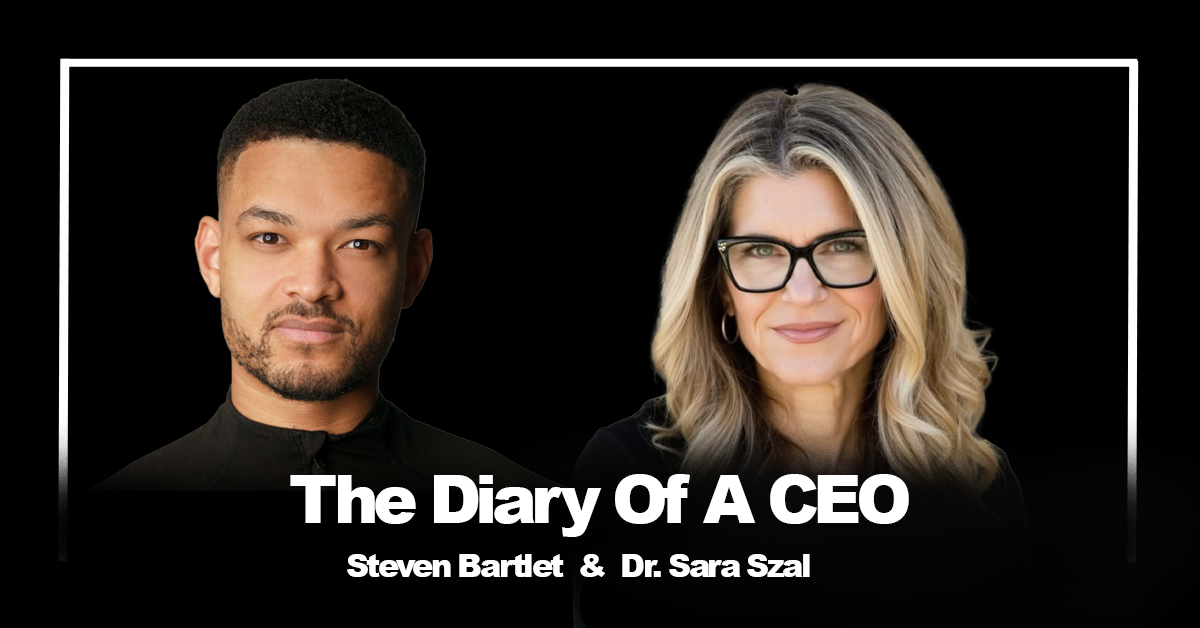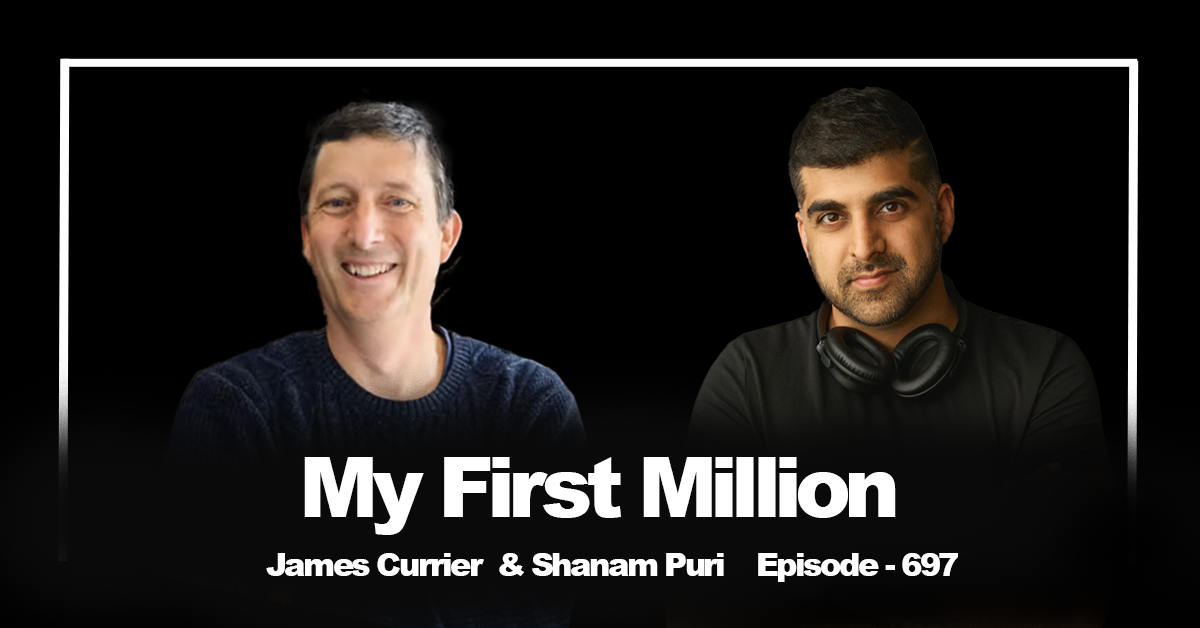This week, Steven Bartlett sits down with Dr. Sara Gottfried, a Harvard-trained physician, hormone expert, and bestselling author who’s dedicated her career to bridging the gap between conventional medicine and holistic wellness.
This conversation is a must-listen, especially for women, but with crucial insights for men too. Dr. Gottfried unpacks the complex world of hormones (cortisol, testosterone, estrogen, insulin), explaining how imbalances impact everything from belly fat and brain fog to mood, energy, and chronic disease risk. She also dives deep into the surprising connections between hormones, childhood trauma (ACEs), stress, diet, relationships, and even societal structures.
Dr. Gottfried shares her personal journey of healing from burnout and hormonal imbalance using lifestyle medicine, offering practical, science-backed strategies anyone can use to feel their best, no matter their age.
Here are the detailed key insights and takeaways:
1. Understanding Hormones: Beyond the Basics
- Hormones as Text Messages: Think of hormones as your body’s communication system, sending signals to keep everything functioning optimally. Imbalances disrupt these messages.
- Cortisol: The Dictator: While essential for life (unlike estrogen or testosterone), cortisol (the stress hormone) acts like a dictator when out of whack. Chronic high cortisol is linked to:
- Increased belly fat (especially in women)
- Brain shrinkage (in women, starting midlife) and brain fog
- Depression (50% of people with depression have high cortisol)
- Reduced testosterone production
- Testosterone: Vitality for All: Crucial for both sexes. In men (levels ~10x higher), low T causes fatigue, low libido, mood swings, and muscle loss. In women, it’s the most abundant hormone, vital for confidence, agency, motivation, and sex drive. High T in women (often linked to PCOS) can cause acne, hair issues, and insulin resistance.
- Estrogen: The Female Regulator (and Male Factor): Regulates the entire female body – mood, joints, skin (collagen), breast/hip development. Critical for men too, especially bone strength. Imbalances are common during perimenopause and postpartum.
- Insulin & Metabolic Health: Crucial for energy. Problems disposing of glucose (often worsened by modern diets and lack of muscle mass) lead to insulin resistance, fatigue, and fat gain, particularly around the abdomen after age 40.
2. The Problem with Conventional Medicine
- Medicine for the Average: Dr. Gottfried argues modern medicine is “broken” because it focuses on treating established disease based on population averages (often from pharmaceutical trials), not on optimizing individual health.
- Ignoring Prevention: Lifestyle medicine (diet, exercise, stress management) can prevent ~70% of chronic diseases, but it’s often ignored due to lack of profit motive.
- Hormone Testing Gaps: Doctors often dismiss hormone testing (especially for cortisol or during perimenopause) claiming levels vary too much, yet readily test in other contexts (like fertility). This leaves many women untreated.
- Lack of Training: Doctors receive minimal training (e.g., 30 mins on nutrition) in crucial lifestyle interventions.
3. Trauma’s Lasting Impact: The ACE Score
- What are ACEs?: Adverse Childhood Experiences (ACEs) include divorce, neglect, abuse (physical, emotional), parental substance use, etc.
- The Score & Health Risk: A validated questionnaire measures ACEs. A score of 1 or higher significantly increases the risk (up to 45x for some conditions) of numerous chronic diseases later in life (Dr. Gottfried’s score is 6/10).
- How Trauma Lives On: ACEs embed in the body, leading to dysregulation in the:
- Nervous System: Overactive stress response (sympathetic dominance), low heart rate variability (HRV).
- Immune System: Increased allergies, histamine issues, food intolerances, autoimmunity.
- Endocrine System: Chronic cortisol problems (initially high, potentially leading to low cortisol burnout).
- Healing is Possible: Addressing the trauma signature (e.g., through therapy, breathwork, psychedelics) is crucial for long-term health.
4. Dr. Gottfried’s Healing Journey & Key Strategies
- Personal Struggle: In her 30s, despite being a physician, Dr. Gottfried experienced depression, PMS, inability to lose baby weight, and pre-diabetes. Conventional medicine offered Prozac and birth control.
- Self-Investigation: She ordered her own labs, found cortisol 3x normal levels, and realized she needed a different approach based on scientific literature and N-of-1 experiments.
- Core Pillars of Her Approach:
- Hormone Balancing: Starting with lifestyle, then considering bioidentical hormones if needed. Cortisol is the priority.
- Personalized Nutrition: Identifying the ideal food plan based on goals, genetics, and potentially CGM data. Focus on adequate protein and fiber (aiming for 30-40g/day via diverse plant sources) to feed the microbiome.
- Prevention & Reversal: Intervening early (e.g., pre-diabetes) using lifestyle to reverse disease course.
- Metabolic Health: Optimizing how the body uses fuel (glucose, ketones) through diet and exercise (especially strength training to build muscle).
5. Optimizing Your Hormones: Practical Tips
- Cortisol Management:
- Mindset: Cognitive approaches to reframe stress.
- Bottom-Up: Breathwork (e.g., resonance breathing: 5s inhale, 7s exhale), meditation, nature exposure (morning light), grounding (barefoot on earth), dancing, rhythmic movement.
- Supplements: Cortisol Manager (Ashwagandha, Phosphatidylserine), Rhodiola. Often taken morning or night.
- Testosterone Balancing:
- Manage Cortisol First: High cortisol suppresses testosterone.
- Diet (for High T/PCOS): Lowering carbohydrates can significantly lower testosterone within 7 days.
- Avoid Endocrine Disruptors: Toxins in plastics (BPA), cans, non-stick pans, skin care (parabens), flame retardants mess with hormones. Filter air and water, choose clean products.
- Estrogen (Perimenopause/Menopause):
- Awareness: Track symptoms and cycles; baseline hormone testing around age 40 is helpful.
- Hormone Therapy: Consider bioidentical hormone therapy early to manage the transition and potentially avoid many symptoms. Often under-prescribed.
- Lifestyle: Strength training, cardiovascular fitness, managing glucose are crucial.
- Know Your Deficiencies: Vitamin D is common (70-80% deficient). B vitamins (especially methylated for those with issues) are key for stress and energy. Baseline biomarker testing is worthwhile.
- Blood Sugar: Use a Continuous Glucose Monitor (CGM) for real-time feedback on food responses. Aim to stabilize blood sugar.
- Microbiome: Feed gut bacteria with diverse fiber (25-35 species/week) – crucial for estrogen regulation.
- Sleep: Prioritize 7-8.5 hours. Poor sleep raises cortisol and insulin, impacting cravings and hormones. Track with wearables (Whoop, Oura, Eight Sleep).
- Alcohol: Significantly lowers HRV (often for days); consider reducing or eliminating.
6. Relationships, Trauma & Healing
- Trauma Bonds: People can form relationships based on intersecting traumas, which can be difficult to navigate or leave.
- Repair is Key: Difficulty repairing after conflict was a major issue in Dr. Gottfried’s marriage. Healthy relationships require the ability to navigate difficult topics.
- Emotional Connection & Sex: For many women, emotional connection is a prerequisite for sexual receptivity (unlike men, who may need sex to feel connected). Quality time and deep questions (like the Conversation Cards) foster this.
- Polarity: Maintaining masculine/feminine polarity (regardless of gender identity) can enhance sexual connection. This involves conscious effort and playfulness.
- Healing Modalities: Besides lifestyle, Dr. Gottfried found psychedelic-assisted therapy profoundly helpful for resolving embedded trauma, though acknowledges it’s not for everyone. Breathwork and flow states offer other paths.
- Speaking Your Truth: Perimenopause/menopause often lifts the “hormonal veil,” leading to greater clarity and less accommodation, sometimes resulting in divorce if core issues aren’t addressed.
7. Final Wisdom: The Power of Awareness & Agency
- Behavior Change is Hard: Adverse childhood experiences create deep patterns. Change requires awareness, motivation (pain of staying the same), and accountability (tracking, coaching).
- N-of-1: You are the experiment. Pay attention to your body’s signals and biomarker data.
- Whole Body Yes: Learn to check in with your heart and gut, not just your cognitive mind, before committing to opportunities.
- Morning Light: Get 5-10+ minutes of morning sunlight exposure (tracing the horizon) to regulate circadian rhythm, mood, and melatonin.
Final Thought:
Dr. Sara Gottfried offers a powerful, integrated vision of health that empowers individuals to take control. By understanding the intricate dance of hormones, the impact of our past, and the power of lifestyle choices, we can move beyond the limitations of conventional medicine and unlock our innate capacity to heal and thrive.
Find Dr. Gottfried’s work, books, and podcast (‘Treated’) at saragottfriedmd.com.
Until next time,
The Podcast Notes Team





